- Home
- Patricia MacLachlan
A Secret Shared
A Secret Shared Read online
Dedication
Children know many secrets—
Some they keep—
Some they find ways to bring into the light.
For Jamie and Lauren, Harry and Lucy.
Love, P. M.
Contents
Cover
Title Page
Dedication
1. The Searcher
2. Truth
3. Birdy
4. One Question
5. Secrets and Toads
6. Love
7. Tillie
8. Beautiful Sense
9. “Eyes and Art”
10. Unlocked
11. Tulips and Stone
12. The Things We Know
13. The Wood Child
14. A Poet’s Truth
15. Linked
16. “This Is Great!”
17. “My Joy”
Excerpt from My Life Begins
About the Author
Books by Patricia MacLachlan
Copyright
About the Publisher
1.
The Searcher
I watch my mother spit into a plastic tube.
A pot of fresh flowers sits on her desk. Every week she walks to the cemetery to put flowers on the grave of her best friend from childhood.
“Flowers and spit?!” I say to her with a grin. “Funny combination! Why the tube?”
She smiles and hands me a pamphlet. “It’s a new simple DNA service, Nora. For exploring your life. You can find out your ancestors. Where you came from.”
She replaces the combs tightly holding back her long hair. She calls it her “professional” look.
“I’ll write about it in my newspaper column,” she says. “I’m always looking for new topics and replies.”
I read the pamphlet direction words out loud.
WHO ARE YOU?
Where were your ancestors born?
Discover your past!
SPIT, PAY, MAIL your DNA.
At the kitchen table my father smiles.
My twin brother, Ben, raises his eyebrows.
My younger sister, Birdy, watches Mother spit, then goes back to turning the pages of her book. Birdy is becoming a reader.
“We learned about DNA in class,” says Ben. “Your DNA is who you are. You send your spit sample and find out your nationality. And the family you came from.”
“And maybe surprises,” says Mother. “Sweet things in my past.”
“What kind of sweet surprises, Mom?” asks Ben. “More than you’re Una Buckley from Ireland,” he adds.
Sometimes Ben is “outspoken.”
In class we had to write a sentence showing we knew the meaning of “outspoken.” My sentence was “My brother Ben is outspoken.”
It made my teacher laugh out loud.
I loved my third-grade teacher, Miss Schyler. We all call her Miss Skylark. I still love her. I talk to her every day after school when I need to—and when I wait for Birdy and Ben to walk home. Miss Skylark always listens.
“My friend Ellie’s mother found ancestors in three different countries,” I say.
“Our principal found a new cousin he dislikes,” says Ben, making Mother and Father laugh.
“Whatever it is, I’ll find out!” says Mother.
“‘The searcher,’ your mother,” says Father.
Mother writes a column for the town newspaper on topics that interest her. She used to work at the newspaper office in town but likes working at home best.
She has a kitchen alcove with her desk and computer.
She put her nameplate in front of the computer—with her Irish name and her married name—
Una Buckley Rossi
“It reminds you who I am,” she told us, joking. “And that I’m working.”
One new column is about bullies.
Una’s View
Do you know a bully?
Are you a bully?
Have you been bullied?
Tell me.
—Una Rossi
The column received over two dozen answers to this question. Mother’s favorite response was from Robert.
I was young when I was bullied. I got help.
Now I’m a therapist and help others.
—Robert M.
Her column on goats brought responses from two family members.
Una’s View
GOATS!
Try goats to clear out your messy yards and woods instead of loud lawnmowers and chain saws. One local service brings an expandable fence, and three goats who will eat everything, even poison ivy!
—Una Rossi
Goats?! Are you kidding me?!
—Jill
Great idea! I hate mowing.
—Jill’s husband
“I used to write poetry,” Mother tells us. “But when I write a poem it flies up and away into the air. I guess I like quick responses—voices coming back to me.”
“The searcher,” repeats Father, kissing Mother on the top of her head. “I have to work now.”
Our father is a university art professor and sculptor of clay, stone, and recently wood.
Mother holds out the DNA padded envelope for him.
“I wrote permission for another DNA searcher. All you have to do is sign,” says Mother.
Father shakes his head. He will not spit in a tube.
“I know where I came from,” he says. “And I know where I’m going.”
“Where did you come from, Papa?” asks Birdy, looking up from her book.
“I’m Giovanni Rossi!” he says. “‘Geo’ to your mama. From Italy!”
“And where are you going?” asks Ben with a smile.
“To buy a new special sculpting saw,” he says. “Do you know when winter comes I can actually sculpt ice?”
“But it will just melt,” says Mother.
Father sighs.
“Yes. That’s part of the beauty of it, Una,” he says. “It’s there and then changes as it melts.”
Surprising us, Mother goes over to him, stands on her tiptoes, and kisses him.
“Kissing!” says Birdy.
“I don’t get you,” Mother says to him.
“I don’t always get you either,” he says. “But it’s all right. You may think that you’ll find ‘sweet’ things in the past, Una. But they’re here. In the present.”
“Like us,” says Ben stubbornly.
“And me!” adds Birdy.
Father goes out the door with a wave to us.
Birdy, named Beatrix but called Birdy by us, closes her book and stands up.
“I want to spit!” she announces.
“Of course you want to spit in a tube!” says Ben.
He hands her a tube. “Here, Birdy.”
Birdy spits and misses. She spits again.
Mother looks up suddenly.
“Don’t put Birdy’s spit sample in the return envelope,” she says.
We hear her careful strong tone.
“Okay,” says Ben.
Mother’s phone rings.
I put the open envelope on the table.
“Let’s read in Nora’s room,” says Ben.
“Come, Birdy,” I say.
“Coming!” calls Birdy as we walk down the hall. “I’m getting more books.”
We should have known—looking back later—that Birdy is beginning a new story.
2.
Truth
Weeks go by. Birdy reads all the time now. She has her very own library card. She reads to my captive father for so long at night he sometimes falls asleep.
“I hear her sweet voice in my dreams,” he says.
Mother still searches—for topics for her column, for things unknown—maybe for “sweet” things in her pas
t?
I read her column from yesterday.
Una’s View
Do you know your ancestors?
How important is family, past and present?
What is the most important thing you owe your family?
I’m looking for truth.
Tell me.
—Una Rossi
The truth? I’ve never seen her ask for the “truth” in her column before. Just responses.
What truth is she looking for?
One response the next day is simple:
I owe my family everyday truths.
That’s my truth that you asked for.
—Bella
Father’s students visit his studio in the side yard, swarming around his sculptures, his stone pieces, his sculpting tools and wood supply.
The students love his new specially made sculpting saw. He has a tall piece of a tree leaning outside against his studio.
“How did that get here?!” I ask.
“I dragged it myself,” Father says proudly. “Maybe I’m ‘the true searcher.’”
Ben shakes his head.
“It’s only a dead tree, Dad,” he says.
“My idea of a treasure,” says Father. “You’ll see one day.”
Ben and I walk to school every day, Birdy sometimes reading to us as one of us holds on to her. Sometimes she skips ahead. We pass the bakery and the library.
Today Mother walks partway with us, carrying a pot of white lilies for her best friend’s grave.
We stop as she opens the cemetery gate and goes in, waving goodbye to us. We never go in—it’s Mother’s private time. There’s nothing there for us.
We walk on to school.
Birdy’s a favorite of the morning crossing guard, Billy.
“Good day, Miss Birdy,” he says.
“It’s going to rain, Billy,” says Birdy.
“Not on me,” says Billy. “I’ll be home.”
“With Mrs. Billy,” says Birdy, making Billy grin.
“I’m going to start calling my wife Mrs. Billy now,” Billy says. “Better yet, her first name is Millie!”
We all laugh.
“Is that the truth?” asks Birdy.
“The truth,” says Billy.
That word again.
We watch Birdy skip all the way to school, chanting, “Millie Billy—Millie Billy—Millie Billy!”
My favorite teacher, Miss Skylark, isn’t in her room after school. Ben, Birdy, and I find her outside on bus duty. Birdy was right. It’s beginning to rain.
“I can read!” Birdy tells Miss Skylark.
“Yay. Best news of the day!” says Miss Skylark. “All those books! Soon you will be a writer, Birdy. Books can show you the way! They did that for Nora. And Ben, too. Nora writes wonderful essays. Ben’s words are strong as a ‘speaker.’”
Ben grins at her.
“You think so?” asks Birdy.
Miss Skylark nods. She takes a plastic bag out of her pocket.
“Here, Birdy. Keep your books dry.”
Birdy hugs Miss Skylark. We hurry on.
Aggie, the afternoon crossing guard, holds a large umbrella over us as we cross the street.
“Thank you, Aggie!” we call as Ben and I take Birdy’s hands and run in the rain.
When we get home and open the front door—shaking raindrops off us—Birdy takes her dry books to her room.
Ben and I see Mother opening a large envelope.
The DNA envelope.
The news she has waited for—whatever it will be—the truth.
3.
Birdy
Mother reads her DNA report silently. Then she looks at us.
“No royalty in this report,” she says. “No drama. No magic. I’ll have to search further for ‘sweet surprises.’”
“Are you disappointed?” I ask.
Mother holds up a finger and thumb, showing an inch.
“A little,” she says.
“But you are Irish?” asks Ben.
“That I am,” says Mother.
She tosses the envelope to Ben as her phone rings. She answers, her back to us.
A paper falls out of the envelope, and Ben picks it up. He stares at it. He looks quickly at my mother, but she’s still on the phone.
He hands the paper to me. His face is suddenly pale.
Mother doesn’t turn around to see it.
I read the paper and my hand shakes a bit. I hide the paper in my pocket and take Ben’s hand.
We hurry down the hallway.
In my bedroom I stare at Ben.
“Birdy put her spit in the envelope!” I whisper. “She wrote her name in the permission space.”
Ben nods and closes the door.
“When no one was looking,” he says.
“Birdy is Swedish,” I say. “Not Irish or Italian.”
I look at the word “Swedish.”
“Birdy’s ancestors were from Sweden?” I say.
Ben sits on my bed.
“Our parents are Irish and Italian. Not a match,” he says softly.
His face is so sad that I sit close to him. He looks at me.
“Who is Birdy?” he asks.
I feel sudden anger. “We know who Birdy is!” I say fiercely.
Then softer—“We just don’t know where she came from.”
“Or who her parents were?” says Ben.
Tears fill his eyes. I’ve never ever seen Ben cry before. Never.
I know something about Ben that he doesn’t know I know. He loves Birdy most of all the family. He has always watched over her, laughing at whatever she does, protecting her when she needs it.
I put an arm around Ben. “Birdy was adopted,” I say. “By us.”
Ben turns to look at me.
“But why the secret?” he says, his voice as fierce as mine had been. “Why?”
I shake my head.
“My friend Ellie was adopted, and she celebrates that day and her birthday,” I say.
“And Birdy’s friend Nico is adopted—and his little sister,” says Ben.
Then Ben gets up and looks out the window. He turns around suddenly.
“What if it’s a mistake, Nora?” he says. “The test could be wrong. We can try again.”
“How?”
“Mother has another envelope. I saw it in her desk drawer. We could send another DNA test,” he says. “I know where she keeps her credit card.”
I am quiet.
“Should we do that?” I say softly.
“We have to,” Ben says. “We can’t forget what we already saw.”
“Couldn’t we just ask Mother and Father?”
Ben sighs. “Not until we know the truth.”
I get up and look out the window with Ben.
“You know the truth can be scary,” I say, watching the rain.
Ben nods. “Yes.”
We stand together, watching the rain grow stronger.
This story is not mine anymore.
This story belongs to Birdy.
Ben has gone to bed.
But I don’t sleep. I sit up thinking about Birdy. Worrying about her.
I stare out my window until night comes and it’s too dark to see the trees or the falling rain.
In the night, when I fall asleep, I have dreams—dreams of someone knocking on the door—come to take Birdy away.
I sit up in bed, frightened, and hurry into Birdy’s bedroom.
She is curled up with her stuffed horse, sleeping peacefully. Her light hair looks like gold in the nightlight. I think of Ben’s dark hair, and mine.
I sit in my bedroom and wait for morning light. I think about Miss Skylark.
The rain ends.
I know what to do.
4.
One Question
The house is quiet. I slip a note under Ben’s door—
I’ve gone to school early.
Take care of Birdy.
—Nora.
I open the door quietly. I walk down
the street—past the bakery and library—past the cemetery.
A woman working just inside the cemetery gate looks up and smiles at me.
I walk to the school. There are no school buses yet. Too early.
I open the big door and go inside, then walk down the hall to Miss Skylark’s room.
She is sitting at her desk. I knew she’d be here. She looks up.
“Nora?”
She looks up at the clock. Then she beckons to me. “Come over here.”
She pushes a chair close to her.
And I burst into tears and tell her everything—the spit in the envelope, my mother’s warning about Birdy’s spit, what Birdy did—and about Birdy being Swedish.
I even tell her about my night dream that someone came to take Birdy away.
Miss Skylark listens to it all. She is quiet. She lets me cry.
There’s a rustle at the door. Miss Skylark looks up. Ben stands there.
“I thought you’d be here,” he says.
“Birdy?” I ask.
“Happy in the library,” he says.
“Come in, Ben,” says Miss Skylark.
He comes over to sit by me. He’s still wearing his black sleep shirt with the many Zs on it.
Miss Skylark leans closer to us, her hands under her chin. She looks at Ben, then me.
“You two have a big secret,” she says. “And you already know that a secret is hard to keep for now—just the two of you.”
She pauses.
“I can think of one question to ask you right now,” Miss Skylark says. “One question.”
“What is that?” asks Ben.
Miss Skylark looks closely at the two of us.
“The question is this: Does it matter?”
We are quiet.
Does it matter?
“Until the problem is solved,” Miss Skylark adds, “does it matter? Birdy is the sister you love. Does it matter where she came from? How she’s come to be here?”
Miss Skylark is quiet then.
Suddenly the school bell rings. We can hear voices in the hallway.
The one question is like something new—a presence that follows us. It follows us after we say goodbye to Miss Skylark, through the day of classes, and at lunchtime.
It follows us when Ben and I walk home after school, Birdy skipping home with us.
“We learned about toads today,” she says. “We visited the Kinder Garden. There is a pet toad there.”

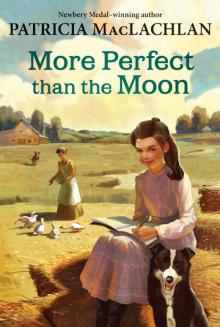 More Perfect Than the Moon
More Perfect Than the Moon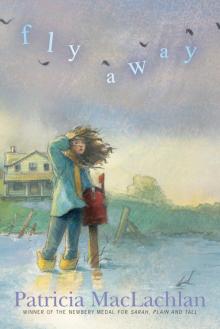 Fly Away
Fly Away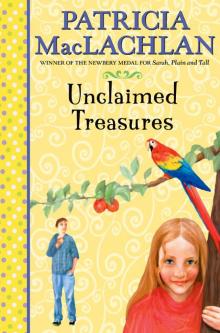 Unclaimed Treasures
Unclaimed Treasures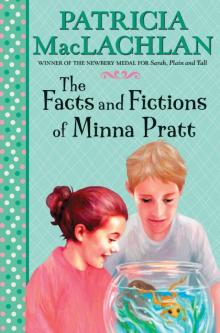 The Facts and Fictions of Minna Pratt
The Facts and Fictions of Minna Pratt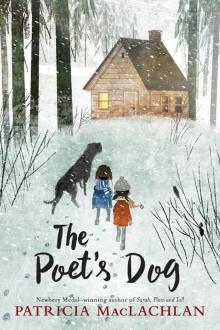 The Poet's Dog
The Poet's Dog Journey
Journey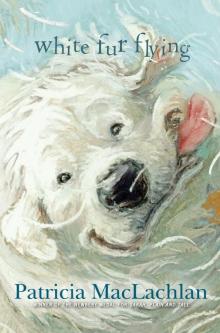 White Fur Flying
White Fur Flying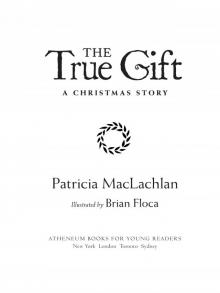 The True Gift: A Christmas Story
The True Gift: A Christmas Story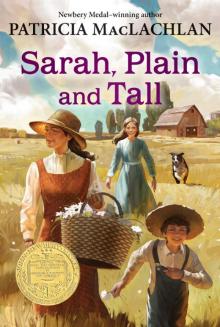 Sarah, Plain and Tall
Sarah, Plain and Tall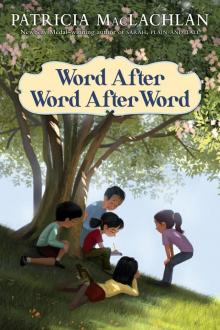 Word After Word After Word
Word After Word After Word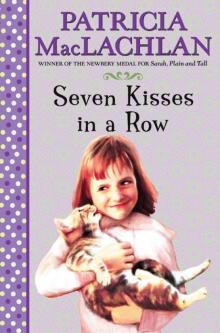 Seven Kisses in a Row
Seven Kisses in a Row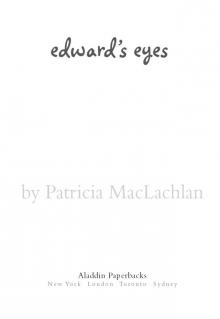 Edward's Eyes
Edward's Eyes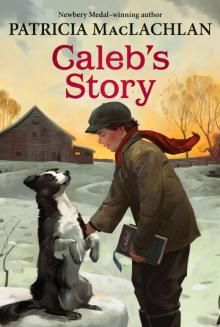 Caleb's Story
Caleb's Story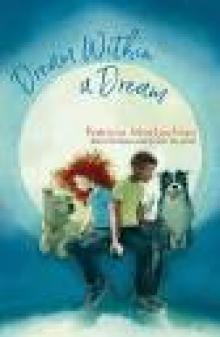 Dream Within a Dream
Dream Within a Dream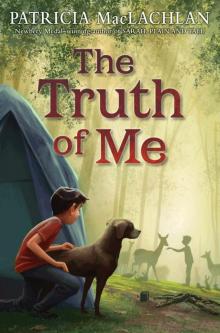 The Truth of Me
The Truth of Me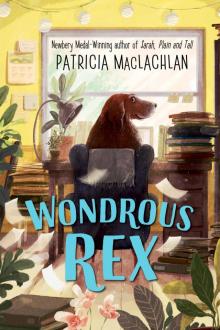 Wondrous Rex
Wondrous Rex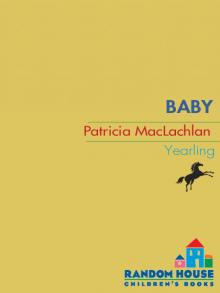 Baby
Baby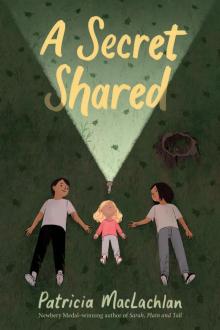 A Secret Shared
A Secret Shared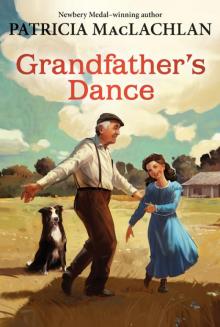 Grandfather's Dance
Grandfather's Dance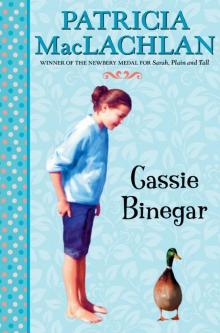 Cassie Binegar
Cassie Binegar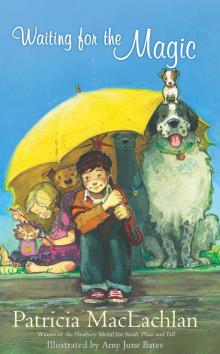 Waiting for the Magic
Waiting for the Magic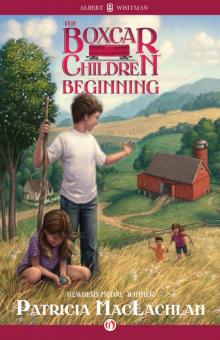 The Boxcar Children Beginning
The Boxcar Children Beginning My Father's Words
My Father's Words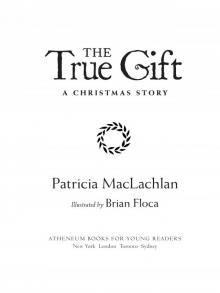 The True Gift
The True Gift